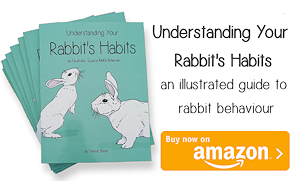Monitoring Your Rabbit's Weight
Once your rabbit has reached adulthood, his or her weight should remain reasonably consistent. Any weight gain or loss may be an indication that your rabbit's diet needs adjusting or that there is an underlying health issue that needs to be investigated.
Is My Rabbit too Fat or too Thin?
It can be difficult to judge a rabbit's body condition visually because their thick fur can hide prominent bones or disguise fat. It will help you to feel your rabbit so you can tell what is underneath the fluff.
A rabbit that's a healthy weight should have a smooth curve from neck to tail, and from hip to hip. You should be able to feel the spine and ribs but they should feel rounded not sharp - like they have a thin layer of padding. It's normal, particularly for females, to have a roll of fur under the chin (called a dewlap), this can look like fat but should just feel like a fold of skin when gently pinched.


Note: These photos have been altered digitally; no bunny was harmed during their production.
Too Thin
As a rabbit looses weight the bones of the pelvis and the ridges of the spine and ribs become increasingly prominent and feel sharp and angular. A very underweight rabbit will have depressions each side of the pelvis and spine. As fat decreases muscle starts to be lost too, which means the legs will be thin and their ability to move maybe compromised.
Too Fat
As a rabbit gets overweight their ribs, hips and spine become hard to feel beneath the layer of fat. Rolls of fat often develop around the tail and ankles, and the dewlap (the fold of skin under the chin) can become extremely large and feels plump. Fat also develops on the chest and stomach area, and may hang down underneath. Viewed from above the rabbit has no obvious waist.
Weighing Your Rabbit
It is much easier to identify changes in your rabbit's body weight using scales rather than visual cues. Checking your rabbit's weight regularly will act as an early warning sign of a problem that needs addressing. It's also helpful to know your rabbit's normal weight, so if you are a bit concerned they are getting to fat or too thin you can compare to see if their weight really has changed.
You can weigh your rabbit on normal kitchen scales. If your rabbit won't sit still, put them in a carrier or box. Deduct the weight of the empty carrier/box to find your rabbit's weight. Bathroom scales may work for heavier rabbits (5kg+), they often have difficultly weighing small rabbits accurately as they are so light.
Another alternative are luggage or fishing scales, which you use by hanging a carrier with your rabbit in below them (again deduct the weight of the carrier afterwards). They are relatively cheap and can work well for larger carriers which may cover the display if you use kitchen/bathroom scales with the read out display on top. You can also purchase 'postal' scales which have the read out screen detached from the weighing plate - these are more expensive so probably only worth it if you have a lot of rabbits you need to weigh regularly.
When buying or using scales, check the maximum weight your scales can read - some kitchen scales only weigh up to 5kg so won't work for very big rabbits. Also check the accuracy, kitchen scales usually tell you the weight to the nearest 1g or 5g, but bathroom scales designed for weighing humans may only measure to the nearest 100g. Generally the smaller your rabbit, the more accurate you want the scales to be as smaller weight changes are more significant.
When you weight your rabbit, make sure you keep a note of the date and weight so you can keep track of changes.What should my rabbit weigh?
This is a difficult question because every rabbit is an individual. Weight varies between rabbits, even those of the same breed, so it is important you compare your rabbit to his normal weight not a breed average. For example, the BRC Breed Standards state that a Dwarf Lop should weigh between 1.93kg and 2.381kg. This is a difference of almost half a kilogram - which would take a rabbit that should be on the lower end significantly overweight and one on the higher range, underweight.
If you are unsure if your rabbit is the correct weight then your vet will be able to examine your rabbit and give you an idea of the ideal weight for your specific bunny. If your rabbit has already been to a vet they may already have a weight recorded for you rabbit recorded in their notes - phone and check.
Weight Gain
If your rabbit puts on excess weight, it is a sign that his diet is providing too much energy and the excess is being stored as fat. Rabbits generally become over weight due to overfeeding energy rich foods, like commercial dry rabbit food, combined with a lack of exercise. A healthy adult rabbit that is gaining weight may need its diet altered to prevent it becoming over weight. This is usually done by reducing the amount of dry food, or feeding a brand that is higher in fibre, and topping up with more hay and fresh foods (leafy greens not high sugar fruits and root vegetables).
Weight Loss
If your rabbit is losing weight then it could mean his diet is not providing enough energy and his body is using up stored energy to compensate. However, it is rare for rabbit's to lose weight purely through a lack of adequate nutrition. Often weigh loss signals a medical problem so you should always consult a vet before assuming it is a diet related.



















